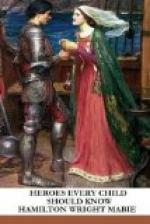All this was done without Lincoln’s knowledge. He had no desire to get into a row with anyone—least of all with the bullies who made up the Clary Grove Boys.
“I won’t do it,” he said, when Offutt told him of the proposed wrestling match. “I never tussle and scuffle, and I will not. I don’t like this wooling and pulling.”
“Don’t let them call you a coward, Abe,” said Offutt.
Of course, you know what the end would be to such an affair. Nobody likes to be called a coward—especially when he knows he is not one. So, at last, Lincoln consented to “rassle” with Jack Armstrong. They met, with all the boys as spectators. They wrestled, and tugged, and clenched, but without result. Both young fellows were equally matched in strength. “It’s no use, Jack,” Lincoln at last declared. “Let’s quit. You can’t throw me, and I can’t throw you. That’s enough.”
With that, all Jack’s backers began to cry “coward!” and urged on the champion to another tussle. Jack Armstrong was now determined to win, by fair means or foul. He tried the latter, and, contrary to all rules of wrestling began to kick and trip, while his supporters stood ready to help, if need be, by breaking in with a regular free fight. This “foul play” roused the lion in Lincoln. He hated unfairness, and at once resented it. He suddenly put forth his Samson-like strength, grabbed the champion of the Clary Grove Boys by the throat, and, lifting him from the ground, held him at arm’s length and shook him as a dog shakes a rat. Then he flung him to the ground, and, facing the amazed and yelling crowd, he cried: “You cowards! You know I don’t want to fight; but if you try any such games, I’ll tackle the whole lot of you. I’ve won the fight.”
He had. From that day, no man in all that region dared to “tackle” young Lincoln, or to taunt him with cowardice. And Jack Armstrong was his devoted friend and admirer.
I have told you more, perhaps, of the famous fight than I ought—not because it was a fight, but because it gives you a glimpse of Abraham Lincoln’s character. He disliked rows; he was too kind-hearted and good-natured to wish to quarrel with any one; but he hated unfairness, and was enraged at anything like persecution or bullying. If you will look up Shakespeare’s play of “Hamlet” you will see that Lincoln was ready to act upon the advice that old Polonius gave to his son Laertes:
“Beware
Of entrance to a quarrel;
but, being in,
Bear it that the opposer may
beware of thee.”
He became quite a man in that little community. As a clerk he was obliging and strictly honest. He was the judge and the settler of all disputes, and none thought of combating his decisions. He was the village peacemaker. He hated profanity, drunkenness, and unkindness to women. He was feared and respected by all, and even the Clary Grove Boys declared, at last, that he was “the cleverest feller that ever broke into the settlement.”




